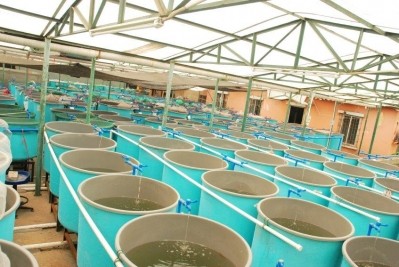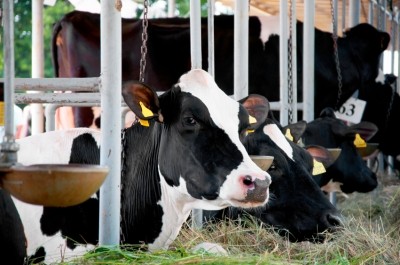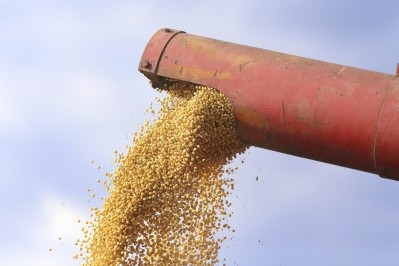Researchers look at replacing soymeal in cows for peanuts

A group of researchers in Brazil tracked the use of peanut cake in the production of cattle. The group reported their findings in the journal Meat Science.
“This study evaluated the carcass traits, physicochemical characteristics and fatty acid profile of beef from feedlot-finished young bulls fed diets supplemented with peanut cake,” said members of the research team.
The group found that the industrial byproduct improves the amounts of polyunsaturated fatty acids (PUFA) when used to replace soybean meal in the feed.
“The replacement of soybean meal with peanut cake at levels up to 100% in the diet of feedlot-finished young bulls does not promote significant changes in carcass traits or beef quality, although it modifies the fatty acid profile of the longissimus thoracis, with a beneficial increase in the levels of polyunsaturated fatty acids,” said the researchers.
Why use peanut cake?
Despite the size of beef herds and production, beef quality is a developing concept in Brazil, said the researchers.
“The concept of beef quality is relative because, in addition to the chemical composition, other parameters including the appearance, juiciness, texture and color are important for product acceptance by consumers (Domingues et al., 2015 and Baba et al., 2016),” they said. “Beef quality, in turn, may be affected by animal nutrition, and several byproducts of biodiesel production may be used as viable alternatives in animal feed (Gonzaga Neto et al., 2015, Oliveira et al., 2015a and Oliveira et al., 2015b).”
The researchers said peanut cake, a by-product of biodiesel production, is an ingredient with high nutritional value; it has protein levels of 41 to 45%, lipid levels of between 8 to 9% and a similar chemical composition to soybean meal, which is a much more expensive feed ingredient.
The study
In the experiment, 32 bulls were fed one of four experiment diets including Tifton 85 hay and 0, 33, 66 or 100% peanut cake in place of soybean meal, said the researchers. The feeding trial ran for about five months.
Animals were weighed at the start of the experiment and every 28 days during it, they said. Animal were harvested at the end of the trial and hot carcass weights and yields were noted.
Carcass traits including leg length (LL), carcass length (CL), cushion thickness (CT), ribeye area (REA) and subcutaneous fat thickness (SFT) were recorded. Amounts of moisture, protein and crude protein were determined.
“The diets, consisting of peanut cake, soybean meal, ground corn, mineral premix, urea and ammonium sulfate at a 9:1 ratio (urea S/A) and Tifton 85 hay (Table 1), were formulated to be isonitrogenous (15% crude protein, CP) and isocaloric (65% total digestible nutrients, TDNs), with a 40:60 roughage: concentrate ratio in the form of a mixed total diet,” said the researchers.
Lipid amounts were established and fatty acids were identified, they said.
Findings
The inclusion of increasing amounts of peanut cake in the diet reduced dry matter (DM) intake and had a negative, linear effect on average daily weight gain, said the researchers. “The higher lipid levels may be favorable because they increase the energy density; however, the increased intake of this fraction may reduce the total DM intake,” they added.
“The replacement of soybean meal with peanut cake at levels up to 100% in the diet of feedlot-finished young bulls promotes a beneficial increase in the levels of PUFAs and the following nutraceutical compounds: conjugated linoleic acid (CLA) and [omega] 3 and [omega] 6 fatty acids,” said the researchers.
However, there was a linear reduction for the animal slaughter weight and hot carcass weight as amounts of peanut cake increased, they said. “The beef texture showed a quadratic effect with the substitution of peanut cake for soybean meal,” they added.
The thickness of subcutaneous fat had a tendency of decreasing as more peanut cake was added to the diet, found the researchers. But, hot carcass yield, carcass length, cushion thickness, leg length, ribeye area, crude protein, mineral matter, moisture and beef color were not altered, they noted.
No changes were seen on the physicochemical characteristics of the longissimus thoracis, they said. DPA and omega 3 fatty acids amounts increased with the addition of more peanut cake in the diet.
Source: Meat Science
Title: Production and quality of beef from young bulls fed diets supplemented with peanut cake
DOI: doi:10.1016/j.meatsci.2016.03.017
Authors: B.R. Correia, G.G.P. Carvalho, R.L. Oliveira, A.J.V. Pires, O.L. Ribeiro, R.R. Silva, A.G. Leão, J.I. Simionato, B.M.A. Carvalho












